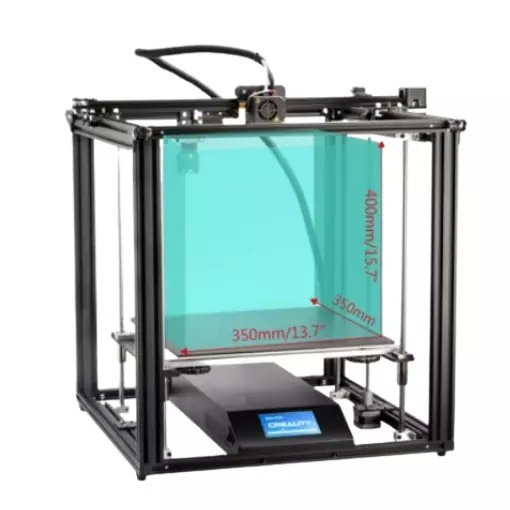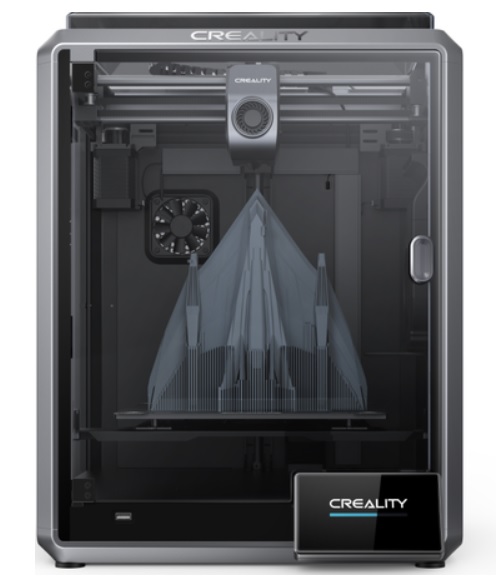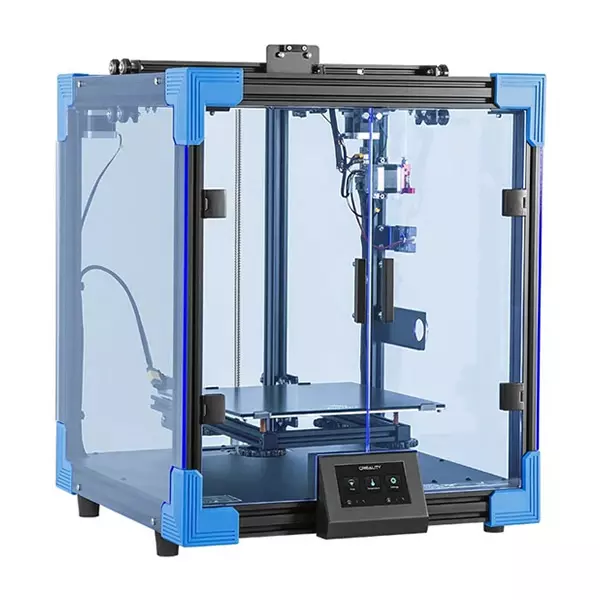Compare Ender 5 Plus vs K1 vs Ender 6
Comparison between the best 3D printers
Choose the best 3D printer at the best price. The cheapest 3D printers are here.
Buy a 3D printer here with 3D Fila.
 |
 |
 |
|
| Model | Ender 5 Plus[BUY Ender 5 Plus] |
K1[BUY K1] |
Ender 6[BUY Ender 6] |
| Estimated price | $599,00 | $399,00 | $499,00 |
| Fabricante | Creality 3D | Creality 3D | Creality 3D |
| Release Year | 2019 | 2023 | 2020 |
| Print Volume [mm] | 350x350x400 | 220x220x250 | 250x250x400 |
| Printer Size [mm] | 632x619x666 | 355x355x480 | 495x495x650 |
| Weight [kg] | 18,2 | 12,5 | 22 |
| Power Loss Recovery | YES | YES | YES |
| Enclosed printer | NO | YES | NO |
| Bed Leveling | Automatic | Automatic | Manual |
| Filament End Sensor | YES | YES | YES |
| Bed type | Heated | Heated | Heated |
| Power supply system | Bowden | Direct Drive | Bowden |
| Standard nozzle | 0,4 | 0,4 | 0,4 |
| Maximum Nozzle Temperature [°C] | 260 | 300 | 260 |
| Maximum Bed Temperature [°C] | 100 | 120 | 100 |
| Maximum printing speed [mm/s] | 180 | 600 | 150 |
| Filament holder | YES | YES | YES |
| Camera for supervision | NO | NO | NO |
| Recommended filaments | PLA, TPU, ABS, PETG | ABS, PLA, PETG, PET, TPU, PA, ABS, ASA, PC, PLA-CF, PA-CF, PET-CF | PLA, TPU, ABS, PETG |
| Recommended slicers | Cura, Simplify, Slic3r | Creality Print; Cura, Simplify3D e PrusaSlicer | Cura, Simplify, Slic3r |
| Maximum Resolution [mm] | 0,1 | 0,1 | 0,1 |
| Processor | 32 bits | 32 bits | |
| Display | Touchscreen TFT 4,3'' | Display touchscreen 4,3'' | Touchscreen TFT 4,3'' |
| Power Supply | 24V / 504W | 110/220V / 350W | 24V / 504W |
| Connectivity | SD / USB | Ethernet / USB / Wi-Fi | SD / USB |
| Operating systems | Windows, Mac, Linux | Windows, Mac, Linux | Windows, Mac, Linux |
| Date of registration in the system | 2021-04-14 | 2023-04-17 | 2021-04-15 |
| Release date | 2019 | 2023 | 2020 |
| Extra features | The Ender 5 Plus offers a large print volume (350x350x400 mm) and fast assembly. It includes a BLTouch sensor, but with range limitations. It stands out for its dimensional accuracy, although it requires adjustments to the slicer settings. Despite the noise, its integrated design saves space, and includes features such as a filament sensor and power resumption. Ideal for large projects, it requires refinement in the settings for high-quality prints. | The K1 is an extremely fast FDM 3D printer, reaching 600mm/s, 12 times faster than standard models. Equipped with a Core XY system and lightweight print head, it offers energy efficiency and high print quality. It stands out for its dual-gear extruder and quickly heated hotend, as well as dual cooling to prevent warping. Its robust structure ensures stability at high speed, with optimized software to speed up the printing process. | The Creality Ender 6 stands out in the world of 3D printers with its CoreXY system, offering fast and high-quality prints. With a robust design, it has acrylic panels to protect against air currents, optimizing the printing of materials that require higher temperatures. It features a generic Creality hotend, effective up to ~240°C. Its differentials include 10mm GATES belts, promoting stability at high speeds, and a 360W power supply for reliable performance. The machine also has an intuitive user interface through a 4.3-inch touchscreen. |
| Support for multiple colors and materials (AMS and CFS) | NO | NO | NO |
Notes * |
|||
| Cost-benefit | 6 / 10 | 8 / 10 | 7 / 10 |
| Hardware | 2 / 10 | 4.8 / 10 | 2.5 / 10 |
| Screen | . | . | . |
| Print volume | 4 / 10 | 3 / 10 | 4 / 10 |
| Performance | 1 / 10 | 5 / 10 | 1 / 10 |
| [BUY Ender 5 Plus] | [BUY K1] | [BUY Ender 6] |
Conclusion |
| In conclusion, when comparing the Ender 5 Plus, K1, and Ender 6, various factors come into play, including price, print volume, speed, and features. The Ender 5 Plus, while priced higher, offers the largest print volume and boasts decent dimensional accuracy. However, it requires some adjustments for optimal performance and is noted for its noise level. Its strengths lie in its capability for larger projects and reliable features like a filament sensor and power recovery. The K1 stands out for its cutting-edge technology and exceptional printing speed, reaching up to 600mm/s, making it ideal for rapid prototyping and time-sensitive projects. Its direct drive system, dual cooling, and robust design provide a high-quality printing experience, despite its smaller print volume compared to the Ender 5 Plus. The Ender 6 finds a middle ground, offering a good balance of features and print volume while incorporating a CoreXY system for solid performance. Although it has some limitations in terms of speed and can be a bit bulkier due to its structure, it is well-suited for high-temperature materials and provides a user-friendly touchscreen interface. Ultimately, the choice among these printers depends on your specific needs: if you prioritize speed and efficiency, the K1 is likely your best option; for larger prints, the Ender 5 Plus shines; and for a reliable all-around performer with decent temperature capabilities, the Ender 6 is a solid choice. Each model presents unique strengths and weaknesses, ensuring that there is a suitable option for a range of 3D printing enthusiasts. |

